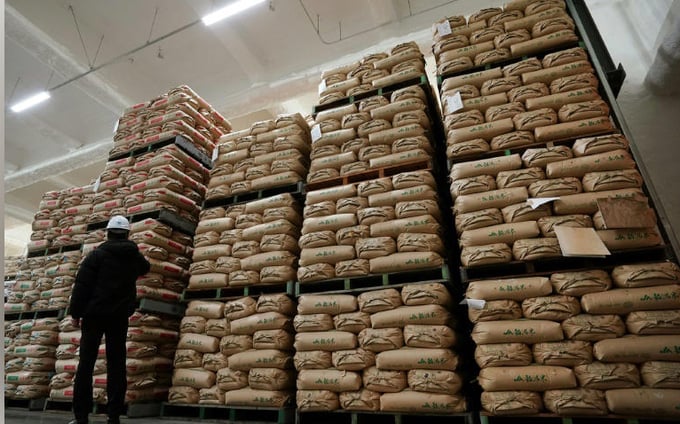November 27, 2025 | 16:09 GMT +7
November 27, 2025 | 16:09 GMT +7
Hotline: 0913.378.918
November 27, 2025 | 16:09 GMT +7
Hotline: 0913.378.918

Rice prices have soared in Japan. Photo: Kazuhiro NOGI.
Rice shortages driven by factors from poor harvests caused by hot weather to panic-buying over a "megaquake" warning last summer have caused prices to nearly double over a year.
Exacerbating the problem, some businesses are also thought to be keeping their inventories and waiting for the most opportune time to sell.
Japan stores about a million tons of rice for emergencies.
The country has previously tapped into these reserves during disasters, but this is the first time since the stockpile was built in 1995 that supply chain problems are behind the move.
The agriculture ministry is expected to select successful bidders for 150,000 tons of rice by Wednesday -- with the auctioned grain expected to hit store shelves by the end of March.
The ministry says it plans to release another 60,000 tons if necessary.
"This is a highly irregular situation," agriculture minister Taku Eto told parliament on Monday.
"By sorting out the clogged parts of the distribution network, we hope to relieve the hardship experienced by consumers."
Experts say several factors have contributed to the crisis.
Among them is a tourism boom and shortages caused by record heatwaves in recent years, as Japan, like other countries, experiences the effects of human-driven climate change.
In August last year, shelves in some stores emptied after the government warned of a possible "megaquake", along with one of the fiercest typhoons in decades and the annual Obon holiday.
msn

(VAN) On the morning of November 27 in Beijing, Minister Tran Duc Thang and the Deputy Commissioner General of the General Administration of Customs of China signed a protocol on fresh jackfruit exports.

(VAN) As floodwaters recede, a vast network of irrigation works across eastern Gia Lai is emerging in a state of severe disrepair, with extensive damage demanding urgent restoration ahead of the 2025-2026 winter-spring cropping season.

(VAN) The conference reviewing three years of implementing Decision 911 identified the need to prioritize improving marine environmental quality and promoting sustainable fisheries development.

(VAN) Le Hoai Trung, Member of the Communist Party of Viet Nam Central Committee and Minister of Foreign Affairs, held talks with Vi Thao, Chairman of the Guangxi Zhuang Autonomous Region (China) this week.

(VAN) The Mekong River Commission adopts the 2026 - 2030 Strategic Plan with a people-centered approach.
/2025/11/26/1720-1-200855_132.jpg)
(VAN) Viet Nam and Japan have many conditions to expand cooperation on climate change adaptation, particularly in disaster risk management based on advanced technologies.

(VAN) The strong development of digital technology and artificial intelligence is opening up opportunities to transform science and technology into a 'Magic eye' for disaster forecasting and early warning.